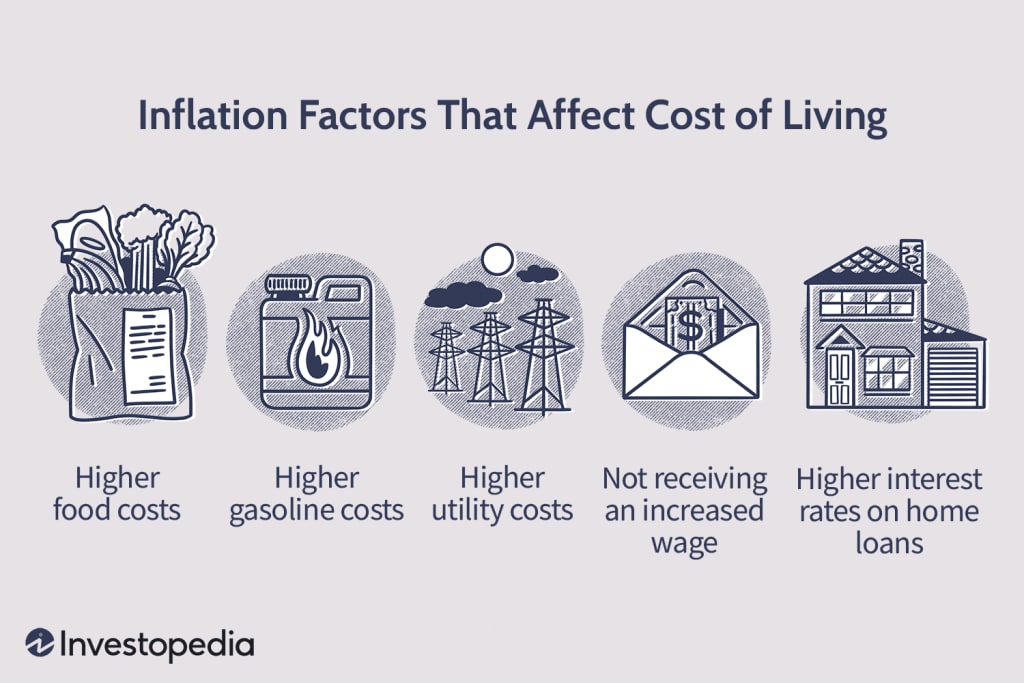The Impact of Inflation on Personal Finances and Strategies to Mitigate Its Effects
inflation effects

Introduction:
Inflation is a financial phenomenon that refers to a sustained growth within side the well-known charge degree of products and offerings over time. While slight inflation is taken into consideration an everyday a part of a healthful economy, excessive or unpredictable inflation may have a massive effect on non-public price range. This article targets to offer an in-depth know-how of the consequences of inflation on non-public price range and gives techniques to mitigate its bad consequences.
I. Understanding Inflation:
A. Definition and Causes of Inflation:
Inflation takes place whilst there's a growth with inside the usual call for items and offerings relative to their deliver, main to upward strain on charges. It may be resulting from different factors along with immoderate authorities spending, expanded manufacturing costs, expansionary financial policies, or deliver chain disruptions.
B. Types of Inflation: Demand-pull and Cost-push:
Demand-pull inflation takes place whilst combination call for exceeds the to be had deliver, ensuing in upward strain on charges. Cost-push inflation, on the alternative hand, arises whilst manufacturing costs, along with wages or uncooked materials, growth, main to better charges for consumers.
C. Measuring Inflation: Consumer Price Index (CPI):
The Consumer Price Index (CPI) is a broadly used degree to tune inflation. It measures the common charge ex-trade of a basket of products and offerings typically fed on through households. By tracking modifications with inside the CPI, economists and policymakers can determine the fee of inflation.
II. The Impact of Inflation on Personal Finances:
A. Decreasing Purchasing Power:
1. Erosion of Real Income:
As charges upward thrust over time, the buying strength of earnings diminishes. If wages do now no longer maintain tempo with inflation, people might also additionally locate it tougher to hold their popular of residing and manage to pay for the equal-amount of products and offerings.
2. Reduced Savings and Investment Returns:
Inflation erodes the fee of financial savings over time. If the go back on financial savings or investments does now no longer outpace inflation, the actual fee of the budget decreases. This can have an effect on lengthy-time period economic goals, along with retirement financial savings, and decrease the capacity to build up wealth.
B. Impact on Debt and Loans:
1. Increased Interest Rates:
Inflation can cause better hobby prices set through primary banks to manipulate the economy. As hobby prices upward thrust, the price of borrowing increases. Individuals with variable-fee loans or credit score card debt might also additionally enjoy better hobby bills, making it greater difficult to control their debt.
2. Decreased Loan Affordability:
Inflation also can have an effect on the affordability of loans. As charges upward thrust, people might also additionally want large mortgage quantities to make purchases, along with shopping for a domestic or financing education. This can growth the load of debt and effect usual economic stability.
III. Strategies to Mitigate the Effects of Inflation:
A. Diversify Investments:
1. Stock Market Investments:
Investing in shares can offer a hedge towards inflation over the lengthy time period. Historically, shares have outperformed inflation, permitting traders to hold or growth their buying strength. However, it is critical to bear in mind man or woman danger tolerance and diversify investments with inside the inventory marketplace.
2. Bonds and Fixed-Income Securities:
Certain forms of bonds, along with Treasury Inflation-Protected Securities (TIPS), are designed to guard towards inflation. These bonds modify their major fee primarily based totally on modifications with inside the CPI, making sure that traders acquire a actual go back above inflation.
3. Real Estate:
Investing in actual property, in particular in regions with robust marketplace fundamentals, can function a hedge towards inflation. Real property values and apartment earning have a tendency to upward thrust with inflation, presenting ability appreciation and earnings growth.
B. Invest in Inflation-Protected Assets:
1. Treasury Inflation-Protected Securities (TIPS):
TIPS are authorities-issued bonds with major values adjusted for inflation
. They provide an assured go back above the fee of inflation, making them a appropriate funding to maintain buying strength.
2. Commodities and Precious Metals:
Investing in commodities, along with gold or oil, can offer a hedge towards inflation. These belongings have a tendency to hold or growth their fee at some stage in inflationary periods.
C. Consider Variable-Rate Investments:
1. Floating-Rate Bonds:
Floating-fee bonds have hobby prices that modify periodically primarily based totally on marketplace conditions. Investing in those bonds can assist mitigate the effect of growing hobby prices, because the coupon bills growth along-side inflation.
2. Adjustable-Rate Mortgages (ARMs):
For people thinking about homeownership, an adjustable-fee loan may be a choice to mitigate inflation risks. ARMs generally have decrease preliminary hobby prices than fixed-fee mortgages, however the prices can modify periodically primarily based totally on marketplace conditions.
D. Control Expenses and Budgeting:
1. Identify and Reduce Non-critical Spending:
By intently analyzing expenses, people can become aware of regions wherein they are able to lessen non-critical spending. This frees up budget that may be redirected closer to investments or financial savings.
2. Practice Smart Shopping and Compare Prices:
Being conscious of charge fluctuations and evaluating charges throughout exclusive stores or provider companies can assist people locate the high-quality fee for his or her money. Utilizing coupons, discounts, and loyalty applications also can make a contribution to price financial savings.
E. Increase Income and Earnings:
1. Seek Career Advancement Opportunities:
Investing in abilities development, pursuing in addition education, or in search of promotions can cause better earnings levels, presenting a higher protection towards inflation.
2. Develop New Skills and Expand Marketability:
Adapting to converting process marketplace tendencies and obtaining new abilities can beautify employability and growth-incomes ability. This flexibility can offer safety towards earnings erosion resulting from inflation.
3. Explore Supplementary Income Streams:
Generating extra earnings thru facet hustles, freelance work, or passive earnings re-assets can assist offset the effect of inflation and offer economic stability.
IV. Considerations for Debt Management:
A. Refinancing Options:
1. Refinancing Mortgages and Loans:
When hobby prices are low, people might also additionally bear in mind refinancing present mortgages or loans to fasten in a decrease fee. This can bring about decreased hobby bills and doubtlessly decrease month-to-month installments.
2. High interest debt consolidation:
Consolidating several high-interest debts into one lower-interest loan can help reduce the total cost of debt and improve manageability.
B. Fixed vs. variable interest loans:
1. Assess risk and return:
When considering borrowing, individuals should assess the potential impact of inflation on credit availability. Fixed-rate loans offer stable payments over time, while variable-rate loans may have a lower initial interest rate but can adjust for inflation.
2. Budget for possible interest rate increases:
People with variable rate loans should plan and budget for possible interest rate increases in the future. This helps ensure that they are able to meet their financial obligations despite rising borrowing costs. V. Long-term financial planning:
A. Retirement planning:
1. Accounting for inflation in pension forecasts:
When calculating the pension need, it is important to consider the impact of inflation on future expenses. Adjusting your retirement savings goals for inflation can help maintain a comfortable standard of living.
2. Increase contributions to retirement accounts:
To prevent inflation from eroding purchasing power, individuals should try to maximize contributions to retirement accounts such as 401(k)s or IRAs by taking advantage of potential employment offers and tax credits.
B. Education and higher education planning:
1. Start saving early and regularly:
Inflation affects the cost of education, including tuition and fees. Starting an education savings plan early and participating regularly can help mitigate the impact of rising education costs.
2. Explore Education Savings Accounts and 529s:
Education savings and 529 plans offer tax benefits and investment growth potential, especially in terms of educational costs. Researching and choosing the most appropriate option can help manage future training costs.
You Ask for professional financial advice:
A. Contact a financial planner:
Working with a qualified financial planner can provide personalized guidance and strategies tailored to your individual financial goals and risk tolerance. They can help assess the impact of inflation on personal finances and recommend appropriate investment and financial planning strategies.
B. Tax planning:
1. Use tax efficient investment vehicles:
Investing in tax-efficient investment vehicles such as Individual Retirement Accounts (IRAs) or tax-efficient mutual funds can help minimize your tax burden and maximize your after-tax income.
2. Consider tax-advantaged accounts.
Researching tax-advantaged accounts such as a Health Savings Account (HSA) or Flexible Spending Account (FSA) can offer tax benefits and help manage health care costs affected by inflation.
Conclusion:
Inflation can have a significant impact on personal finances by reducing purchasing power, increasing borrowing costs and reducing the value of savings. However, individuals can mitigate the negative effects of inflation by diversifying investments, investing in inflation-protected assets, managing expenses, increasing income, effectively managing debt and seeking professional financial advice. By adopting appropriate strategies and considering long-term financial planning, individuals can navigate the challenges presented by inflation and strive to achieve their financial goals while maintaining financial stability in an inflationary environment.
About the Creator
Reader insights
Outstanding
Excellent work. Looking forward to reading more!
Top insights
Compelling and original writing
Creative use of language & vocab
Easy to read and follow
Well-structured & engaging content
Expert insights and opinions
Arguments were carefully researched and presented
Eye opening
Niche topic & fresh perspectives
Masterful proofreading
Zero grammar & spelling mistakes
On-point and relevant
Writing reflected the title & theme






Comments
There are no comments for this story
Be the first to respond and start the conversation.